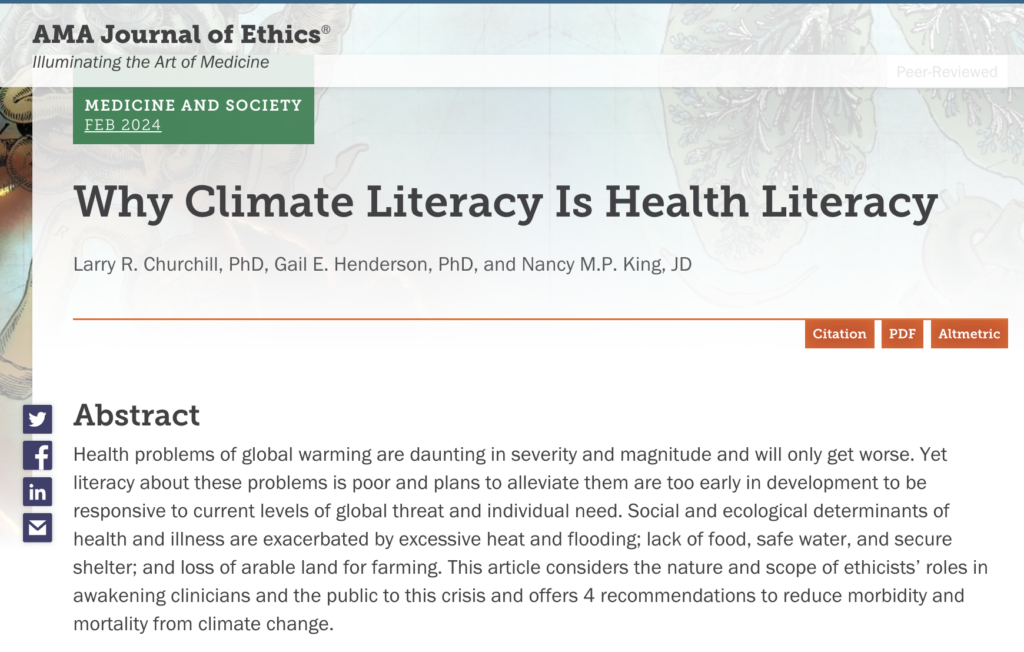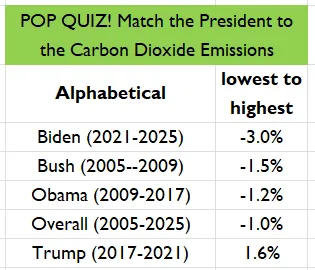https://journalofethics.ama-assn.org/article/why-climate-literacy-health-literacy/2024-02
Abstract
Feb 2024
Health problems of global warming are daunting in severity and magnitude and will only get worse. Yet literacy about these problems is poor and plans to alleviate them are too early in development to be responsive to current levels of global threat and individual need. Social and ecological determinants of health and illness are exacerbated by excessive heat and flooding; lack of food, safe water, and secure shelter; and loss of arable land for farming. This article considers the nature and scope of ethicists’ roles in awakening clinicians and the public to this crisis and offers 4 recommendations to reduce morbidity and mortality from climate change.
Health Literacy and Climate Literacy
The concept of health literacy has long been of concern to bioethics, which has focused on 2 considerations. First, bioethicists have helped prepare educational materials, develop clinicians’ communication skills, and empower patients to ask questions, all to enable individuals to understand basic and personally relevant health information. Second, bioethicists have emphasized that “low” health literacy is not a stigmatized individual failing but rather a failure of public education and health care institutions. The definition of health literacy was revised in Healthy People 2030 to emphasize that individuals should be able not only to understand but also to use health-related information for their benefit, and, importantly, to emphasize organizations’ role by defining organizational health literacy as “the degree to which organizations equitably enable individuals to find, understand, and use information and services to inform health-related decisions and actions for themselves and others.”1 This expanded definition places much-needed emphasis on the key justice component of health literacy: organizations’ duty to “equitably enable” the health literacy of individuals.
Climate literacy expands this organizational duty and its justice implications because it requires not only educating populations about complex and politically contested data but also enabling effective use of those data. This latter requirement in turn entails changing not only individual behavior but also the practices of the very organizations that have contributed to climate change and health disparities in the United States and around the world. Bioethics and the medical establishment have a difficult and critically important task ahead: to help everyone fulfill their duty to understand and act upon information about climate change and its adverse and disparate health effects.2
Health Problems of Global Warming
The effects of climate change are profound, overwhelming, and increasingly severe. Melting polar ice; shrinking permafrost regions; rising and warming oceans; hotter average temperatures; increasingly frequent and severe forest fires, hurricanes, typhoons, and similar storms; and unprecedented flooding are part of what we are already experiencing and what we can expect to worsen.
The health consequences of these environmental changes are almost unimaginable. Massive numbers of deaths, especially among the world’s poorest populations, will occur because of unrelenting heat, uninhabitable land, food and water shortages, and the breakdown of economies and national governments. Already a quarter of the earth’s population lacks safe drinking water, with the result that nearly 2 billion people currently struggle to meet their daily needs for clean water.3 By 2030, increased salination of irrigated farmland, evaporation caused by increased heat, and frequent flooding of coastal areas will mean that an additional 1 billion people will be without a safe source of potable water.4 Moreover, climate change affects the spread, intensity, and seasonality of infectious diseases like malaria and cholera.5, 6 In general, climate change will produce a substantial increase in transmission of disease worldwide.4 Heat emergencies, mental health disorders, and broader health problems like declining food safety and its consequences add to the growing damage of climate change.7



